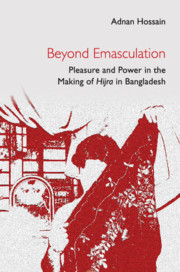Book contents
- Frontmatter
- Dedication
- Contents
- List of Figures
- Acknowledgements
- Introduction: Pleasure, Power and Masculinities
- 1 Kinship, Community and Hijragiri
- 2 Class-Cultural Politics and the Making of Hijras
- 3 Hijra Erotic Subjectivities: Pleasure, Practice and Power
- 4 The Paradox of Emasculation
- 5 Practices and Processes of Gendering
- 6 Love and Emotional Intimacy: Hijra Entanglement with Normative Bangla Men
- 7 Contemporary Transformation of Hijra Subjectivities
- Conclusion: Shifting Meaning and the Future of Hijras
- Glossary
- References
- Index
6 - Love and Emotional Intimacy: Hijra Entanglement with Normative Bangla Men
Published online by Cambridge University Press: 06 August 2021
- Frontmatter
- Dedication
- Contents
- List of Figures
- Acknowledgements
- Introduction: Pleasure, Power and Masculinities
- 1 Kinship, Community and Hijragiri
- 2 Class-Cultural Politics and the Making of Hijras
- 3 Hijra Erotic Subjectivities: Pleasure, Practice and Power
- 4 The Paradox of Emasculation
- 5 Practices and Processes of Gendering
- 6 Love and Emotional Intimacy: Hijra Entanglement with Normative Bangla Men
- 7 Contemporary Transformation of Hijra Subjectivities
- Conclusion: Shifting Meaning and the Future of Hijras
- Glossary
- References
- Index
Summary
Anyone conducting fieldwork with hijras might be struck by the way they often immerse themselves in ‘ulu jhulu’, the hijra expression for fun. Although I initially had the impression that hijras are extremely fun-loving and happy people, I was later told by my interlocutors that this ulu jhulu is basically a facade, beneath which flowed a stream of despair in which hijra lives are perennially mired. In explaining to me the fount of this constant despondence, hijras pointed to their deep yearning for a lover, or parik. Pariks, the hijra word for partner/lover/ husband, play a significant role in the lives of hijras. Although pariks are not part of hijragiri, they are an indispensable source of joy and anxiety for the hijras.
Although male-bodied, feminine-identified people have been amply documented and theorized within anthropology of gender and sexual diversity, very little attention has been paid to the roles their lovers or partners play in the formation of their subjectivities (Besnier 2004; Kulick 1998). One outcome of this sustained incuriosity about the partners is that these so-called gender-variant groups have become the embodiment of gender and sexual difference unto themselves. Analytically, such inattention works to rigidify hijras as instances of gender–sexual difference alone. The extent to which hijra subjectivities are formed relationally can potentially suggest new directions in understanding and explaining hijras. Such incuriosity about partners may be explained in terms of the fact that partners—and in the case of hijras, the normatively masculinized Bangla men—lack the exotic appeal that anthropologists generically find in hijras or other such groups. Partly this inattention is the result of the relative invisibility of the partners. Specifically, in the case of hijras, as I suggest later, there is an overt tendency to ‘invisibilize’ their partners. This invisibility of partners, I would argue, points to a broader politics of masculinity and gendering of desire within and against which hijra subjectivities are situated.
Besnier (2004) foregrounds the problematic erasure of partners in the anthropological explorations of ‘transgender’ people in the context of Tonga, arguing that this ethnographic silence is not a mere descriptive omission. Rather, this inattention not only works to prevent us from understanding the formation of the subjectivities of gender-variant people generally but also often contributes to their social exclusion and moral abjection.
- Type
- Chapter
- Information
- Beyond EmasculationPleasure and Power in the Making of <I>hijra</I> in Bangladesh, pp. 157 - 180Publisher: Cambridge University PressPrint publication year: 2021



